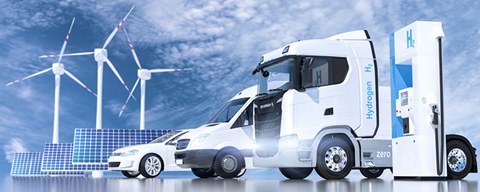Hydrogen LAB
Membraneless electrolyzers for producing green hydrogen
Table of contents
Motivation
The pursued energy transition aims to limit greenhouse gas concentrations in the atmosphere and counteract the drastic change of the global climate. Low-emission or zero-emission technologies play a fundamental role here, increasingly replacing fossil fuels. One example is green hydrogen, which is produced from renewable energies in an electrolysis process. The German national hydrogen strategy aims to create large production capacities for green hydrogen. In order to make its production marketable despite the fluctuating supply of renewable energies, the costs for production, operation and maintenance of electrolyzers must be reduced.
Membraneless electrolyzers can make a significant contribution thanks to several factors, such as their simple design, low-cost electrode materials and the absence of an expensive membrane.
Goal and concept of the lab
The H2 Lab will study alkaline water electrolysis for producing hydrogen with a focus on membraneless technologies. The project is intended to provide a platform for interdisciplinary research at the Institute of Process Engineering and Natural Materials Technology.
Structural goals
- Establishing structures and working spaces allowing researchers to interact and cooperate, unifying component of the H2 strategy at TUD.
- Enabling interdisciplinary cooperation on complex issues related to hydrogen
- Creating the possibility for students to work interdisciplinary, for example in the context of their Diplom theses or semester paper
Research objectives
- Characterizing electrodes with respect to material, shape, structure, specific surface area
- Understanding of the coupling between two-phase flow, mass transport and electrochemistry in electrochemical processes
- Design and construction of an experimental test rig for membraneless alkaline electrolysis (including the option to include peripheral components)
Focal areas of research
Research in the H2 Lab focuses on alkaline electrolysis to produce hydrogen, in particular using membraneless electrolyzers.
The following aspects will be investigated:
- Characterization of different electrodes (shape and structure) in electrochemical experiments
- Investigation of two-phase flow: Gas bubble development and dynamics (nucleation, coalescence, detachment)
- Conducting electrochemical experiments, recorded by high-speed cameras
- Developing suitable methods for image analysis as well as new sensor technology for multiphase flows
- Designing and constructing a membraneless electrolyzer
Current partners
- Helmholtz Zentrum Dresden-Rossendorf, Department Transport processes at interfaces
- University of Twente
- Eindhoven University of Technology
- ITM Linde
- Linde
- Shell
- Network within the School of Engineering Sciences at TUD (Professors Fröhlich, Lasagni, Lippmann, Hurtado, Czarske, Gumhold)
Current projects
- Sinewave / H2Giga (2021-2025): Workpackage 3 (OxySepT) [Partners: Linde, ITM Linde, Technical University of Munich], BMBF
- ECCM KICkstart DE-NL (2022-2024), Partners: University of Twente Enschede, Funding: NWO
- Innovation pool project “Solar hydrogen - highly pure and compressed (Solarer Wasserstoff – hochrein und komprimiert)”, 2021-2024, [Partners: FZJ, KIT, HI-ERN], Funding: BMBF
- Junior research group SEALEC, 2021-2022, R. Baumann, various TUD Chairs, SMWK
- Newly applied for: ALKALIMIT, 2024-2027, K. Eckert, [University of Twente Enschede, TU Eindhoven, VDL, Vitesco], NWO-BMBF
Publications
- Syed Sahil Hossain, Aleksandr Bashkatov, Xuegeng Yang, Gerd Mutschke, Kerstin Eckert (2022), Force balance of hydrogen bubbles growing and oscillating on a microelectrode, Physical Review E 106 (3), 035105
- Aleksandr Bashkatov, Syed Sahil Hossain, Gerd Mutschke, Xuegeng Yang, Hannes Rox, Inez M. Weidinger, Kerstin Eckert (2022), On the growth regimes of hydrogen bubbles at Microelectrodes, Physical Chemistry Chemical Physics (PCCP) 24, 26738, DOI: 10.1039/d2cp02092k
- Ömer Akay, Aleksandr Bashkatov, Emerson Coy, Kerstin Eckert, Kristian Etienne Einarsrud, Andreas Friedrich, Benjamin Kimmel, Stefan Loos, Gerd Mutschke, Lars Röntzsch, Mark D. Symes, Xuegeng Yang, Katharina Brinkert (2022), Electrolysis in reduced gravitational environments: current research perspectives and future applications, npj Microgravity (2022) 8:56 (www.nature.com); https://doi.org/10.1038/s41526-022-00239-y
- A Bashkatov, A Babich, SS Hossain, X Yang, G Mutschke, K Eckert (2023), H2 bubble motion reversals during water electrolysis, Journal of Fluid Mechanics 958, A43
- L. Krause, K. Skibińska, H. Rox, R. Baumann, M. M. Marzec, X. Yang, G. Mutschke, P. Żabiński, A. Fabián Lasagni, K. Eckert (accepted on 23.03.2023), Hydrogen bubble size distribution on nanostructured Ni surfaces: electrochemically active surface area versus wettability, ACS Applied Materials and Interfaces (2023).
Contact
Prof. Dr. Kerstin Eckert
Chair of Transport Processes at Interfaces
+49 351 463-34430
Dr. Xuegeng Yang
Group Leader Electrochemical Systems
+49 351 463-32982

